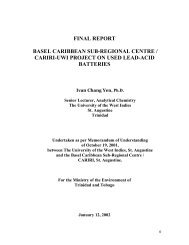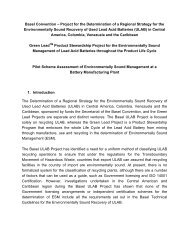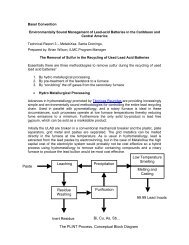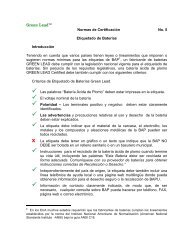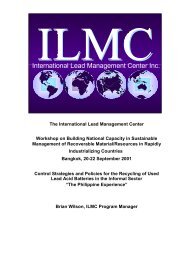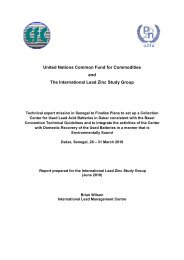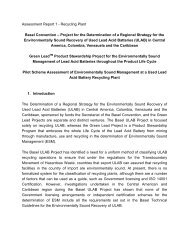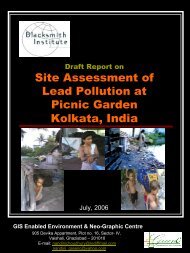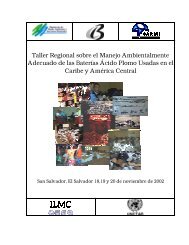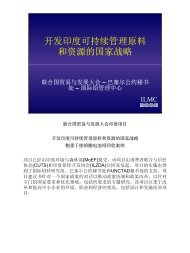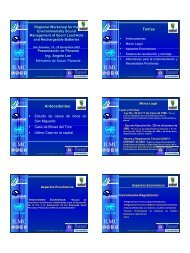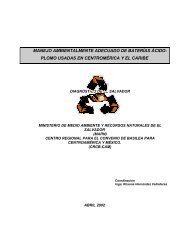ILMC Visit Report to Duncan Battery Plant.pdf - the International ...
ILMC Visit Report to Duncan Battery Plant.pdf - the International ...
ILMC Visit Report to Duncan Battery Plant.pdf - the International ...
You also want an ePaper? Increase the reach of your titles
YUMPU automatically turns print PDFs into web optimized ePapers that Google loves.
<strong>ILMC</strong> <strong>Visit</strong> <strong>Report</strong><br />
December 3 2003<br />
Basel Convention Project –<br />
Regional Strategy for <strong>the</strong> Environmentally Sound Management of Used Lead<br />
Acid Batteries in Central America, Colombia, Venezuela and <strong>the</strong> Island States of<br />
<strong>the</strong> Caribbean<br />
Acumuladores <strong>Duncan</strong>, C.A.<br />
Cagua <strong>Plant</strong>,<br />
Cagua<br />
State of Aragua<br />
Venezuela<br />
The purpose of site visits by <strong>ILMC</strong> staff is <strong>to</strong> provide expert opinion and advice <strong>to</strong><br />
<strong>the</strong> project stakeholders on <strong>the</strong> environmental performance of <strong>the</strong> recovery<br />
operations for ULAB and <strong>the</strong> standards of occupational health of all those<br />
workers involved in <strong>the</strong> recycling process.<br />
This report represents <strong>the</strong> views and opinions of <strong>the</strong> <strong>International</strong> Lead<br />
Management Center (<strong>ILMC</strong>). Fur<strong>the</strong>rmore, any comments contained in <strong>the</strong> report<br />
about <strong>the</strong> procedures, practices and lead recovery processes observed and any<br />
recommendations <strong>to</strong> improve environmental performance and raise <strong>the</strong><br />
standards of occupational health are those of <strong>the</strong> <strong>ILMC</strong>.<br />
Whilst representatives of <strong>the</strong> Basel Secretariat, <strong>the</strong> Project Steering Committee<br />
and <strong>the</strong> Environment Ministries of Venezuela, Trinidad and Tobago, Barbados,<br />
Jamaica, <strong>the</strong> Dominican Republic, and El Salvador, and <strong>the</strong> Health Ministry of<br />
Panama <strong>to</strong>ge<strong>the</strong>r with <strong>the</strong> Solid Waste Management Authority of St. Lucia were<br />
present during <strong>the</strong> visit, <strong>the</strong>ir views and opinions are not represented in this<br />
report.<br />
Brian Wilson, <strong>ILMC</strong> Program Manager
<strong>ILMC</strong> <strong>Visit</strong> <strong>Report</strong><br />
Acumuladores <strong>Duncan</strong>, C.A.<br />
Cagua <strong>Plant</strong>,<br />
Cagua<br />
State of Aragua<br />
Venezuela<br />
Following <strong>the</strong> delegates’ visit <strong>to</strong> <strong>the</strong> Fundición del Centro C.A. secondary lead<br />
plant <strong>the</strong> management of <strong>the</strong> nearby Acumuladores <strong>Duncan</strong> fac<strong>to</strong>ry invited <strong>the</strong>m<br />
<strong>to</strong> <strong>to</strong>ur <strong>the</strong> manufacturing plant. The <strong>Duncan</strong> Group must be congratulated for<br />
providing <strong>the</strong> delegates with an opportunity <strong>to</strong> see at first hand how lead acid<br />
batteries are made.<br />
Acumuladores <strong>Duncan</strong> 1 C.A., has more than forty years experience in <strong>the</strong><br />
manufacture of lead acid batteries. For over 30 years <strong>Duncan</strong> au<strong>to</strong>motive<br />
batteries have been <strong>the</strong> battery of choice and <strong>the</strong> preferred local component for<br />
vehicles assembled in Venezuela. Indeed, <strong>the</strong> <strong>Duncan</strong> brand is available for all<br />
types of vehicles, trucks and buses. In addition, <strong>the</strong> <strong>Duncan</strong> Group also<br />
manufactures Industrial batteries for <strong>the</strong> following applications:<br />
<br />
<br />
<br />
<br />
<br />
Telecommunications – back up battery power for power outages<br />
Solar, nuclear and electric energy generation – electrical s<strong>to</strong>rage<br />
Petroleum and petrochemical – specialized vehicles and equipment<br />
Security installations – backup power supplies so <strong>the</strong> systems are “ON”<br />
Computer installations – UPS battery packs for surges and power outages<br />
However, <strong>the</strong> only batteries <strong>the</strong> delegates observed being made at <strong>the</strong> Cagua<br />
<strong>Plant</strong> were au<strong>to</strong>motive lead acid batteries.<br />
The fac<strong>to</strong>ry was clean and <strong>the</strong> housekeeping <strong>to</strong> high standard. Walkways were<br />
clear and materials neatly stacked in allocated bays and service points.<br />
It was obvious during <strong>the</strong> <strong>to</strong>ur that <strong>the</strong> company works hard <strong>to</strong> maintain quality<br />
standards in battery manufacture and that <strong>the</strong> workers <strong>to</strong>ok pride in<br />
demonstrating <strong>the</strong> manufacturing process <strong>to</strong> <strong>the</strong> delegates.<br />
Whilst <strong>the</strong> machines on <strong>the</strong> plate assembly sections did not have <strong>the</strong> latest downflow<br />
personal ventilation systems, where necessary, employees were wearing<br />
respira<strong>to</strong>rs.<br />
Ventilation in <strong>the</strong> “Finishing” shed was better than most battery manufacturing<br />
plants, but <strong>the</strong>re were obvious problems with acid leakage from some of <strong>the</strong><br />
tanks and as a result one of <strong>the</strong> walkways was out of bounds <strong>to</strong> visi<strong>to</strong>rs.<br />
1 <strong>Duncan</strong> web site is available in English and Spanish: http://www.duncan.com.ve/
Within <strong>the</strong> context of <strong>the</strong> Basel ULAB Project in <strong>the</strong> Caribbean, Central America,<br />
Colombia and Venezuela, <strong>the</strong>re is one recommendation that <strong>ILMC</strong> would like <strong>the</strong><br />
<strong>Duncan</strong> management <strong>to</strong> consider, and that is <strong>to</strong> improve <strong>the</strong> labeling on all<br />
batteries so that each battery clearly shows:<br />
<br />
<br />
<br />
<br />
<br />
<br />
<br />
<br />
The international recycling symbol ISO 7000-1135, better known as <strong>the</strong><br />
Moebius loop.<br />
Instructions for recycling <strong>the</strong> battery when it is at <strong>the</strong> end of its useful life,<br />
including <strong>the</strong> words “Contact your battery supplier”.<br />
A point of contact clearly displayed so that inquiries can be made if<br />
necessary. This can be phone, fax, web site or electronic address.<br />
The words “lead-acid battery”, "Pb" or <strong>the</strong> words "LEAD".<br />
The words “Protect <strong>the</strong> Environment – Recycle this <strong>Battery</strong>."<br />
A bar code with information about <strong>the</strong> battery’s place of manufacture, <strong>the</strong><br />
date of production, <strong>the</strong> battery type and its components, including a list of<br />
<strong>the</strong> alloying elements.<br />
The international hazard symbol for acid.<br />
The words “Do not dispose of this battery in Household waste or at a<br />
Municipal Waste Dump”<br />
Ideally, as <strong>Duncan</strong> Batteries are sold throughout <strong>the</strong> Americas and <strong>the</strong><br />
Caribbean, <strong>the</strong> text should be in English and Spanish.<br />
Adopting such comprehensive labeling will help <strong>to</strong> promote recycling and set a<br />
standard for all o<strong>the</strong>r battery manufacturers <strong>to</strong> follow.<br />
Brian Wilson, Feb 2004



